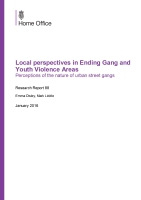Off Site

Local perspectives in Ending Gang and Youth Violence areas
Perceptions of the nature of urban street gangs
To improve understanding of how local experiences of street gangs may have changed recently, and to better understand the national gangs picture and the challenges and emerging threats facing local areas, the UK Home Office commissioned RAND Europe to deliver research in 33 local areas which are part of the Ending Gang and Youth Violence programme. The study drew upon the experiences of practitioners from a range of agencies who are involved in formulating local responses to urban street gangs and pulled together the most recent research and practice literature. The aim was to support strategic decision making around future work to improve outcomes for individuals and communities affected by gangs and gang activity.
Please note: This report is not available on the RAND website but can be downloaded from the GOV.UK website.
Table of Contents
Chapter One
Introduction
Chapter Two
Estimated numbers of gangs and gang members
Chapter Three
Perceptions of the defining features of gangs
Chapter Four
Age of gang members and involvement of young people in gangs
Chapter Five
Gang structure and initiation
Chapter Six
Inter-gang cooperation and conflict in custody and the community
Chapter Seven
Visibility, identifiers and use of social media
Chapter Eight
Criminal activities including organised criminal activities and use of weapons
Chapter Nine
Involvement of women and girls in gangs
Chapter Ten
Radicalisation
Chapter Eleven
Discussion
Appendix A
Methods and approach
Appendix B
Survey instrument
Research conducted by
The research described in this report was prepared for the Ministry of Justice and conducted by RAND Europe.
This report is part of the RAND Corporation research report series. RAND reports present research findings and objective analysis that address the challenges facing the public and private sectors. All RAND reports undergo rigorous peer review to ensure high standards for research quality and objectivity.
The RAND Corporation is a nonprofit institution that helps improve policy and decisionmaking through research and analysis. RAND's publications do not necessarily reflect the opinions of its research clients and sponsors.


